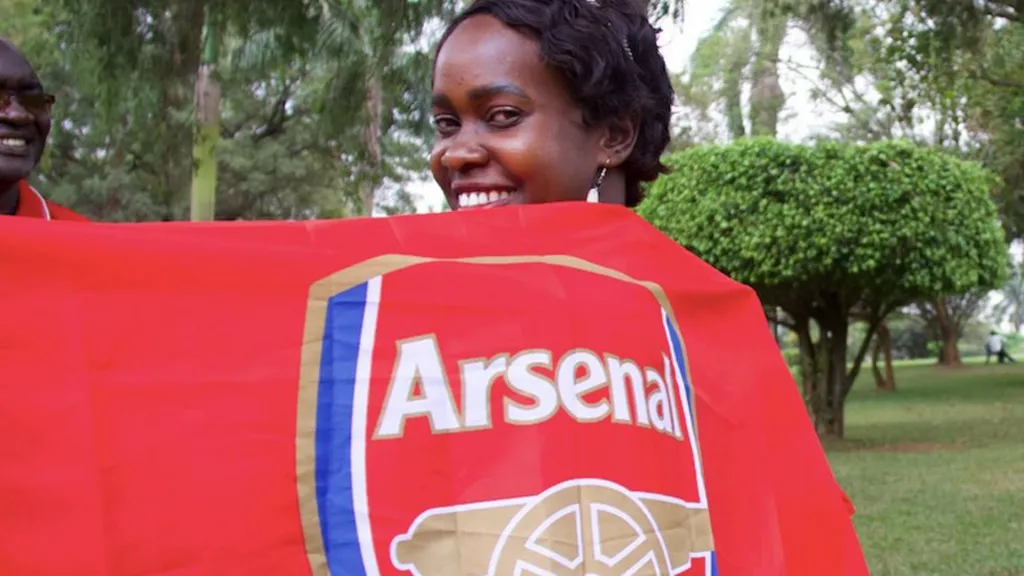Uganda might just be home to the world’s most passionate Arsenal fans. The East African country erupted with joy this week after Arsenal’s 3-0 win over Real Madrid in the Champions League quarter-final first leg, with celebrations taking place outside video halls and bars across towns and villages. For many Ugandans, especially those dressed in the iconic red and white, Arsenal feels less like a foreign team and more like a national treasure.
Alongside Manchester United, Arsenal is one of the most followed English Premier League (EPL) clubs in Uganda. Their matches command huge attention, with fans hosting pre-match church services where prayers are offered for victory. The emotional connection is so deep that it fuels a booming industry. Shops and roadside vendors make brisk sales of jerseys and merchandise. Bigger businesses align their adverts with match results, and for betting companies, every Arsenal fixture represents a major business opportunity.
The passion isn’t without consequences. In 2023, a group of Arsenal supporters were arrested for organizing an unauthorized victory parade after defeating Manchester United. The level of fanaticism, however, goes beyond joyful celebration and sometimes spirals into violence. Rivalries between fans of Arsenal and other EPL giants, especially Manchester United, have led to fatal clashes. One such tragedy occurred in December near Lake Victoria, where a 30-year-old carpenter, John Senyange, was shot dead by a security guard during post-match celebrations. Another incident involved a United fan being stabbed by an Arsenal supporter after a heated argument about a match.
Uganda has a long history of football-related violence, dating back to the 1980s when local club rivalries between teams like Express FC and SC Villa led to stone-throwing and brawls. Today, experts believe the intensity has been magnified by the influence of sports betting. With over 2,000 betting shops situated near bars and viewing centres, many young men turn to gambling as a source of income. Apps make it easy to place bets, and the emotional stakes are high. When results don’t go as hoped, frustrations often boil over into aggression.
Amos Kalwegira, a Manchester United fan in Kampala, explained how betting transforms football into an emotional investment. Sports scientist Lumbuye Linika added that instead of simply enjoying the game, Ugandans have turned EPL matches into a livelihood. Although betting has brought revenue—$50 million in taxes last year, according to local reports—experts like Linika argue that poor emotional management, rather than the industry itself, is the core issue.
Liverpool fans, who are generally seen as calmer and older, believe the deadly rivalry mainly stems from Arsenal and Manchester United supporters, often from poorer neighborhoods. Arsenal fan Agnes Katende disagrees, claiming that the passion shown is simply unmatched. The female fan base is also strong in Uganda, with clubs like Mama Liverpool’s women-only fan group showing just how deeply the love for the EPL runs across demographics.
According to Solomon Kutesa, secretary of the official Arsenal Supporters Club Uganda, the country’s drinking culture also plays a role in escalating post-match tensions. Watching games in bars, where fans are often intoxicated, makes it harder to control reactions when teams lose.
Some believe the solution lies in revitalizing Uganda’s own football league. Uganda Football Coaches Association Chairman Stone Kyambadde suggested that bringing fans back to local stadiums would reduce the obsession with European football. Former Ugandan football legend Tom Lwanga reminisced about the golden days when local matches drew massive crowds and called for a return to that era. Meanwhile, MPs like Asuman Basalirwa are working to boost support for domestic football by encouraging leaders to attend local matches.
Despite the issues, fans like Kutesa remain optimistic. Inspired by Arsenal legends like Nwankwo Kanu and Thierry Henry, he sees this season as a chance for the team to reclaim former glory. While their EPL title hopes may have dimmed, Arsenal fans across Uganda are holding on to the dream of reaching the Champions League semi-finals for the first time in 16 years—if they can avoid defeat in the second leg against Real Madrid.
Uganda’s deep-rooted passion for Arsenal and the Premier League is undeniable. It has built a strong sense of community and pride, but it also highlights the need for better emotional regulation, responsible gambling, and investment in local football to ensure that the love for the game brings joy, not tragedy.














Leave a comment